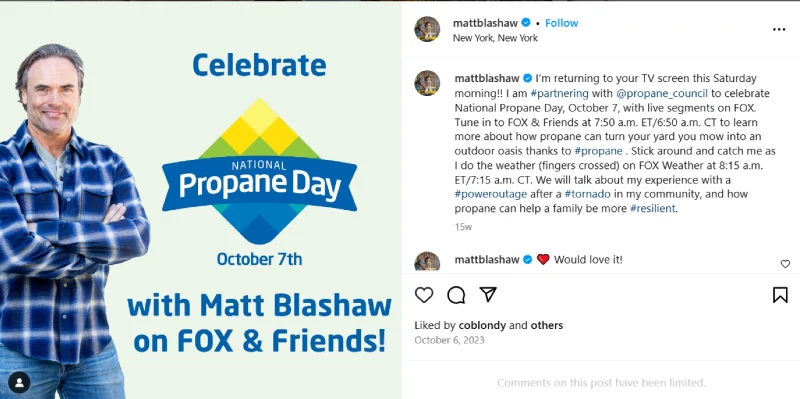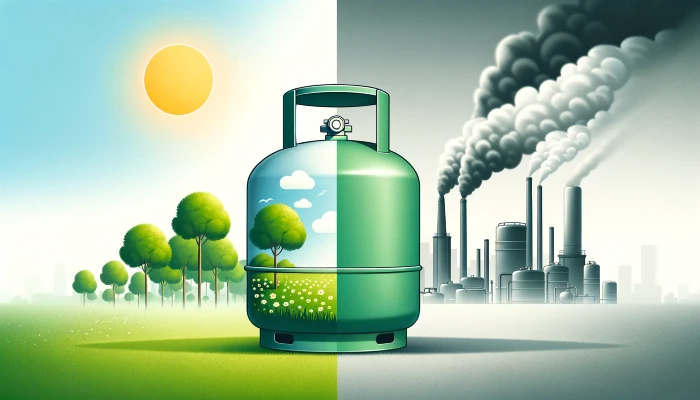The Industry's $30 Million Bid to Repaint Its Image
In the heart of a heated debate on climate action, an unexpected player emerges from the shadows, brandishing a narrative of eco-friendliness. The Propane Education & Research Council (Perc), a prominent U.S. lobbying group, has injected nearly $30 million into a media crusade, painting propane as the newest member of the clean energy family. But beneath the glossy ads lies a starkly different reality, one where propane’s environmental implications are artfully downplayed.
The bulk of propane, contrary to its marketed image, is a by-product of refining natural gas or crude oil. Despite this, Perc’s high-budget advertising efforts, as revealed by Drilled, a climate-focused multimedia reporting project, have been persistent in pushing the narrative of propane as a renewable and clean energy source.
Yet, in a twist of transparency, a November 2022 public meeting recorded by the Energy and Policy Institute unveiled the internal dialogue within Perc. Board members openly acknowledged the disconnect between public perception and the environmental truth of propane. “Twenty-five percent [of people consider] natural gas to be renewable, in this millennial and gen Z bucket,” admitted an unidentified Perc board member. The strategy? Leveraging this misconception to benefit propane’s image.
The conversation took a cautionary turn when Leslie Woodward, a Perc board member, highlighted the inaccuracy of equating natural gas with renewable energy. However, the focus swiftly returned to the power of perception over reality.
Erin Hatcher, Perc’s senior vice-president of communications and marketing, emphasized the importance of positioning propane alongside clean energy sources, distancing it from the likes of coal. Yet, in a response to inquiries, Hatcher defended Perc’s stance, denying any intent to mislead. “There’s no attempt to mislead whatsoever. It’s to educate, because the narrative that predominates the news is that there’s only one way to a clean future, and we don’t believe that” she stated.

Propane's Green Mirage: The Surge in 'Eco-Friendly' Advertising
As the clock ticks towards 2050, the year earmarked by scientists for achieving net-zero greenhouse emissions, a peculiar trend surfaces in the energy sector. Amidst this urgent call for climate action, the Propane Education & Research Council (Perc) has embarked on a marketing crusade, amplifying propane’s presence as a clean energy contender, despite glaring environmental concerns.
Propane, a fossil gas primarily obtained from natural gas or crude oil refining, has recently been thrust into the eco-spotlight. This move comes even though only a minuscule 0.04% of propane comes from non-fossil sources like plant or animal oils, as per EPA and US Energy Information Administration estimates. Even so-called “renewable propane,” derived from bio-based materials, isn’t free from environmental drawbacks, releasing carbon dioxide, nitrous oxide, and other fossil fumes.
In a stark revelation, it’s noted that propane’s carbon emissions, while less than coal or diesel, exceed those of natural gas when used as fuel. The relatively low CO2 emissions from propane in the US are attributed not to its cleanliness, but to its lesser consumption compared to gas and oil.
Yet, undeterred by these facts, Perc has funneled millions into a bold initiative to recast propane from a “dirty fossil fuel” to a purportedly clean energy alternative.
This strategic shift in branding saw an astronomical rise in Perc’s advertising expenditure, soaring over 17-fold from $1.7 million in 2021 to nearly $30 million in the following years, as reported by Drilled. In fact, the video below was seen by over 7 million each airing in 2023 on NBC nightly news.
Perc’s advertising onslaught spanned across a wide array of media platforms, from YouTube channels (including YouTube Kids) to mainstream news networks like Fox News and NBC, showcasing propane’s so-called clean energy potential. The move raises eyebrows, especially considering Google’s (owner of YouTube) policy against ads denying climate change or negating human contribution to global warming. However, this policy doesn’t extend to promotions of various energy sources, leaving a loophole for such ads.
Clean energy experts and misinformation specialists express deep concern over Perc’s narrative. Directly contradicting Perc’s claims, they assert that propane, whether conventional or renewable, is neither a clean energy solution nor a viable, scalable response to climate challenges.
Wren Montgomery, an associate professor of sustainability at Western University, points out that the fossil fuel industry’s expertise in greenwashing is nothing new. “Pitching propane as ‘clean energy’ seems to be just their latest greenwashing scheme,” Montgomery remarks.

Adding to this, Charlie Spatz, research manager at the Energy and Policy Institute, notes that the fossil fuel industry has a history of attempting to label its products as renewable. “And so we’ve seen Perc, in some respects, catch up with the oil industry and natural gas industry to present their product as renewable, when in reality that product is not available in quantities that consumers can even access at this point.”
In response, Erin Hatcher of Perc acknowledges that no energy source is entirely clean, referencing the carbon footprint of renewable energy production methods. However, she notably refrains from labeling propane as renewable energy. “Nobody here is trying to pretend that propane is not a fossil fuel-based fuel,” she clarifies. “We’re not trying to pretend that it is renewable.”
When pressed on whether propane can match the perceived climate-friendliness of wind or solar power, Hatcher concedes, “At the actual operation? No.”
Perc's Millennial Dilemma: A Desperate Bid for Climate-Conscious Approval
As the environmental crisis deepens, the Propane Education & Research Council (Perc) finds itself at a crossroads, grappling with the daunting task of appealing to a generation deeply invested in climate action. In a bold move, Perc released an internal video in July 2021, labeling electrification efforts as an “existential threat” and positioning propane as “a clean energy solution for everyone.”
Dakoa was able to track down this internal video, which appears below. It’s nearly an hour long, but it’s an eye-opening look behind-the-scenes as a lobbying organization pieces together its greenwashing campaign.
This strategic pivot aimed at capturing the attention of an audience who prioritize the climate crisis. Perc’s 2022 market research painted a hopeful picture: a significant number of environmentally aware millennials held favorable views of propane. “We started thinking, is it possible they don’t know the origins of propane?” Erin Hatcher mused during Perc’s November 2022 annual meeting in Destin, Florida.
Hatcher claimed a survey of 1,000 U.S. adults revealed that 97% didn’t recognize propane as a fossil fuel. Interestingly enough, Hatcher later contested this figure, when speaking with multiple media outlets, yet declined to share the marketing survey referenced in her presentation.
A hurdle emerged: despite overall positivity towards propane, a mere 9% of survey respondents saw it as renewable energy. Consequently, Perc board members deliberated a marketing approach for propane sourced from renewable and fossil fuels alike. “When they understand that propane is not only a low carbon fuel, in the conventional version, but renewable offers even greater benefits, environmental benefits, we can change their opinion of this energy,” Hatcher stated.
Yet, skepticism within Perc’s own ranks surfaced. Another board member cautioned that once millennials learn propane is predominantly a fossil fuel, the majority would likely dismiss it, regardless of its renewable claims.
“We’re in trouble if we don’t win them over,” Hatcher admitted. “We’re really in trouble. So we need to get them on our side and kind of educate them about the benefits of propane.”
Contrary to Perc’s assertions, energy experts refute the notion that propane’s climate impact is lesser than methane gas.
“It is not the lowest greenhouse gas fossil fuel. It’s somewhere between natural gas and diesel,” clarified Nikita Pavlenko, program lead at the International Council on Clean Transportation. Even renewable propane, though emitting less carbon dioxide and nitrous oxide than its fossil-derived counterpart, is not zero-carbon like solar or wind energy. The production of renewable propane in the U.S. is meager, at best – a mere 4.5 million gallons in 2022, compared to the 12.7 billion gallons of fossil fuel-derived propane.

Pavlenko notes the frequent promises of renewable alternatives, like renewable propane, that rarely materialize. “They often do very little to secure supply.” He also pointed out the exaggerated claims regarding camelina plant-based propane, a touted low-carbon alternative, in Perc’s ads. “The camelina is largely theoretical at this point,” he remarked, highlighting the scarcity of camelina-based propane production.
The New York Times, which received over $163,000 from Perc for ads between 2022 and 2023, asserts a strict policy against misleading or deceptive advertising. Yet, Hatcher describes these figures as “estimates.”
Experts collectively view Perc’s claims of propane as “clean energy,” “environmentally friendly,” and a crucial component of “the path to zero carbon emissions” as mere greenwashing. In their view, these assertions are a veneer masking the less palatable environmental truths about propane.
Perc's 2024 Eco-Facelift: A Bid to Rebrand for 'Green' Credibility Amidst Scientific Scrutiny

As the environmental narrative intensifies, the Propane Education & Research Council (Perc) prepares to amplify its efforts in 2024, aiming to repaint propane with an eco-conscious brush.
Despite the mounting criticism and skepticism from environmentalists and energy experts alike, Perc is doubling down on its mission to market propane as an ally in the fight against climate change.
Examination of Perc’s documents reveals an ambitious plan: a $12.8 million advertising budget targeting new demographics, notably ‘eco-inclined’ homeowners. This financial projection excludes an additional $6.4 million slated for ‘environmental campaigns’ and $1.3 million for ‘thought leadership’ initiatives.
In a bid to bolster its green image, Perc has enlisted at least 15 influencers, including HGTV personalities and celebrity chefs, to spread its message. One novel marketing approach includes placing ads in AccuWeather’s severe weather alerts, subtly linking propane to climate resilience.
However, Perc’s reach extends beyond the consumer realm into the corridors of legislative power.
Faye Holder, program manager at InfluenceMap, notes a parallel between Perc’s tactics and those long employed by the natural gas industry. “All these talking points that you see about ‘clean gas’ and ‘gas is lower emissions’ are not just advertising but also used in direct lobbying to policymakers,” Holder explains. These efforts aim to shape climate policies and safeguard the role and business of gas in the face of potential regulatory crackdowns.
Holder criticizes this advertising strategy as “very misleading to consumers,” labeling the portrayal of fossil gas as a green climate solution as outright disinformation. “It’s just not true,” she asserts.
In the face of these critiques, Erin Hatcher, Perc’s spokesperson, reveals a mix of determination and frustration. She reiterates Perc’s commitment to being part of the climate solution, envisioning a future where propane replaces coal and diesel. However, when confronted with the scientific consensus of phasing out fossil fuels entirely, Hatcher’s confidence wavers. “Is there a world without propane? Possibly,” she concedes, reflecting uncertainty about the future role of propane in a climate-conscious world.
As 2024 looms, Perc’s push to recast propane as a green energy source raises pivotal questions. Can a fossil fuel-derived energy, with its undeniable environmental impacts, truly align with the rigorous demands of an eco-friendly future? And, more critically, can advertising and lobbying efforts reshape the scientific consensus on what constitutes a genuine solution to the climate crisis?
More To Discover
- Australia Intensifies Crackdown on Greenwashing in Investment Sector
- Musk Lied About Using Terminally Ill Monkeys at Neuralink; They Died Horribly
- U.S. Launches First Car-Ready E-Fuel With 1 Billion Liters in Production
- Why Bioplastics Aren’t the Eco-Solution We Hoped For (Australia Is The Perfect Example)
Final Thoughts
This ongoing saga illustrates the complex and often contentious intersection of environmental realities, corporate interests, self-serving narratives spun by influential industry players, and public perception.
As the world grapples with the urgency of climate action, the line between education and misdirection becomes increasingly significant and this isn’t likely to change as ‘green’ marketing has many forms.
Crafting a narrative around propane’s role in the climate crisis reveals a tangle of contradictions, ambitions, and harsh realities. As Perc pushes forward with its rebranding efforts, it’s crucial to remain vigilant and discerning, recognizing the fine line between genuine environmental solutions and cleverly disguised greenwashing. In the race against climate change, every decision, every policy, and every investment counts. Our actions today will write the story of tomorrow’s world.



















